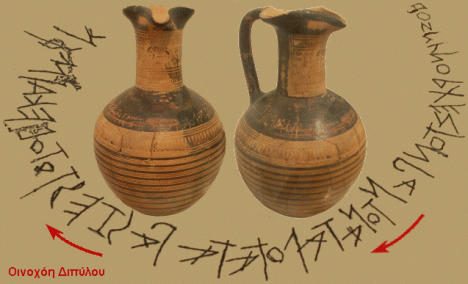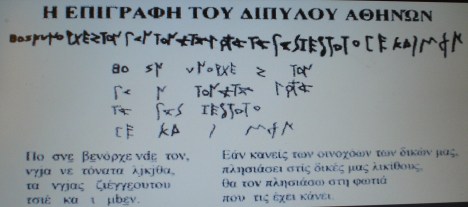Shkrimi pellazgjik ,afër Athinës ,veç dhjetëra fakteve të tjera vërteton se identiteti i ketij vendi(Athinës) ishte identitet Arvanit, Iliro - Shqipëtar dhe aspak news Grek Kemi dhënë dhe do të japim shumë fakte . Ju japim njërin .
in english
Writing pellazgic, near Athens, among dozens of other facts proves that the identity of this country (Athens) was Arvanit identity Illyrian - Albanian and Greek We have no news given and will give many facts. You give one.
in english
This finding represents a Pelasgian language document, which officially renamed the Greeks lost language. For young Greeks, not comparable with the best classical Greeks considered lost language, how to say the truth burning, that Pelasgian language is the language of Albania and the Albanian neighbors Greece (Arvanites)
We know we have the luxury of good in both languages easily understand the explanation of this language from Albanian and tragically .This issued Arbanitët as aborigines and not as immigrants as will officially propaganda Greek news.
Without discussion Albanians are older Greece by Greeks in Greece
Οι Αρβανιτες είναι αυτοχθονοι και όχι ως μετανάστες όπως τους θελη η επίσημη προπαγάνδα των νεων Ελληνων
For more
Book in Greek of N. Styllos
http://www.scribd.com/doc/33225941/Arxaia-Arvanitika-Keimena
For more
http://ellines-albanoi.blogspot.com/2011/05/1.html
http://www.youtube.com/watch?v=gCeVyz_t4Sw&feature=related
in english
Writing pellazgic, near Athens, among dozens of other facts proves that the identity of this country (Athens) was Arvanit identity Illyrian - Albanian and Greek We have no news given and will give many facts. You give one.
Γράφει λοιπόν σε κάποιο σημείο, το Αρβανίτικο blog.
Στο Δίπυλο της Αθήνας έχει βρεθεί μια πήλινη κρασοκανάτα επί της οποίας είναι γραμμένη μια από τις πολλές σωζόμενες αρβανίτικες επιγραφές. Υπολογίζεται ότι κατασκευάστηκε περίπου το 725 π.Χ.
και βρίσκεται στο Εθνικό μουσείο των Αθηνών. Η επιγραφή είναι γραμμένη σε γραφή που αρχίζει από δεξιά και την δίνουμε ανεστραμμένη, χωρισμένη σε λέξεις μεταγραμματισμένη και μεταφρασμένη.
Η επιγραφή αυτή καθώς μας δόθηκε από τον συγγραφέα κο Νίκο Στύλο.
Στο Δίπυλο της Αθήνας έχει βρεθεί μια πήλινη κρασοκανάτα επί της οποίας είναι γραμμένη μια από τις πολλές σωζόμενες αρβανίτικες επιγραφές. Υπολογίζεται ότι κατασκευάστηκε περίπου το 725 π.Χ.
και βρίσκεται στο Εθνικό μουσείο των Αθηνών. Η επιγραφή είναι γραμμένη σε γραφή που αρχίζει από δεξιά και την δίνουμε ανεστραμμένη, χωρισμένη σε λέξεις μεταγραμματισμένη και μεταφρασμένη.
Η επιγραφή αυτή καθώς μας δόθηκε από τον συγγραφέα κο Νίκο Στύλο.
Και ιδού η …Αρβανίτικη ερμηνεία.
Είναι γραμμένη σε παλαιό αττικό αλφάβητο κυκλικά από τα δεξιά στα αριστερά (επί τα λαιά). Η επιγραφή, σε συνεχή γραφή, λέγει τα εξής:
ΑΡΒΑΝΙΤΕΣ. ΑΛΗΘΕΙΕΣ ΚΑΙ …ΜΠΟΥΡΔΕΣ
http://kopanakinews.wordpress.com/2008/11/06/432/
In Dipylon Athens has found a clay flagon on which is written one of the many surviving Arvanite inscriptions. An estimated constructed in 725 BC
located at the National Museum of Athens. The inscription is written in a script that starts right and we inverted, divided into words transliterated and translated.
This inscription as given to us by the author Mr. Nikos Stylo.
...............................................................................located at the National Museum of Athens. The inscription is written in a script that starts right and we inverted, divided into words transliterated and translated.
This inscription as given to us by the author Mr. Nikos Stylo.
This finding represents a Pelasgian language document, which officially renamed the Greeks lost language. For young Greeks, not comparable with the best classical Greeks considered lost language, how to say the truth burning, that Pelasgian language is the language of Albania and the Albanian neighbors Greece (Arvanites)
We know we have the luxury of good in both languages easily understand the explanation of this language from Albanian and tragically .This issued Arbanitët as aborigines and not as immigrants as will officially propaganda Greek news.
Without discussion Albanians are older Greece by Greeks in Greece
Οι Αρβανιτες είναι αυτοχθονοι και όχι ως μετανάστες όπως τους θελη η επίσημη προπαγάνδα των νεων Ελληνων
Οι Αρβανιτες είναι αυτοχθονοι και όχι ως μετανάστες όπως τους θελη η επίσημη προπαγάνδα των νεων Ελληνων.Χωρίς συζήτηση οι Αλβανοί στην Ελλάδα (Αρβανιτες) είναι αρχαιότεροι από Έλληνες στην Ελλάδα
For more
Book in Greek of N. Styllos
http://www.scribd.com/doc/33225941/Arxaia-Arvanitika-Keimena
For more
http://ellines-albanoi.blogspot.com/2011/05/1.html
«..Είτε το θέλουμε εμείς ή εκείνοι είτε όχι είμαστε αδελφοί λαοί,με κοινή ιστορία κοινή καταγωγή καί κοινές παραδόσεις»:ΙΩΑΝΝΗΣ ΚΟΥΜΑΡΗΣ(εγκυκλοπαιδικό λεξικό «ΗΛΙΟΣ»)
«..Είτε το θέλουμε εμείς ή εκείνοι είτε όχι είμαστε αδελφοί λαοί,με κοινή ιστορία κοινή καταγωγή καί κοινές παραδόσεις»:ΙΩΑΝΝΗΣ ΚΟΥΜΑΡΗΣ(εγκυκλοπαιδικό λεξικό «ΗΛΙΟΣ»)
---------------------------------------------------------------------------------
The Lost Truth
Source
http://www.thelosttruth.altervista.org/SitoEnglish/pelasgian_etruscan_english.html
Source
http://www.thelosttruth.altervista.org/SitoEnglish/pelasgian_etruscan_english.html
------------------------------------------------------------------------------------------------------------------------------
The Lost Truth
Source
|
Source
------------------------------------------------------------------------------------------------------------------------------
21,689

















